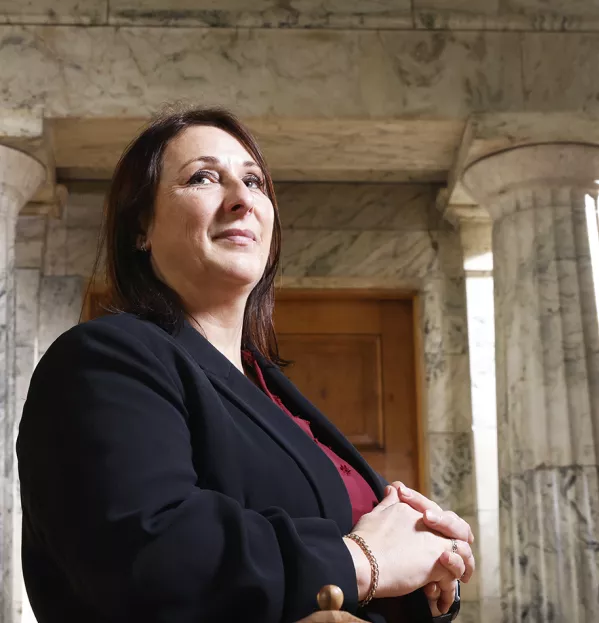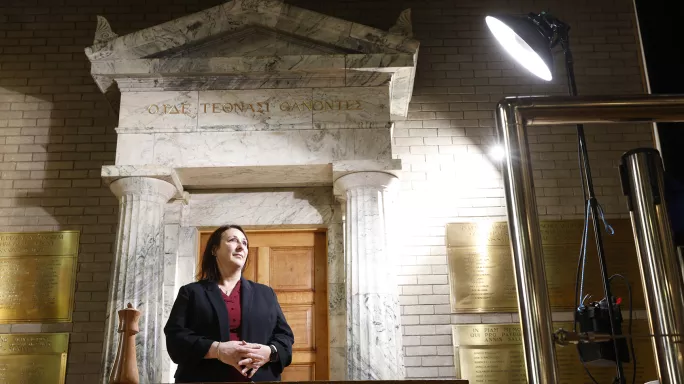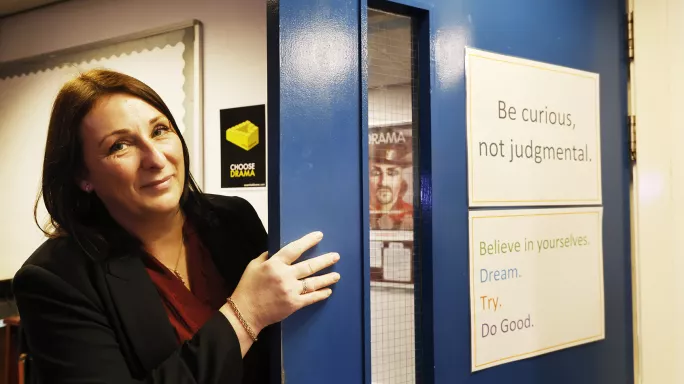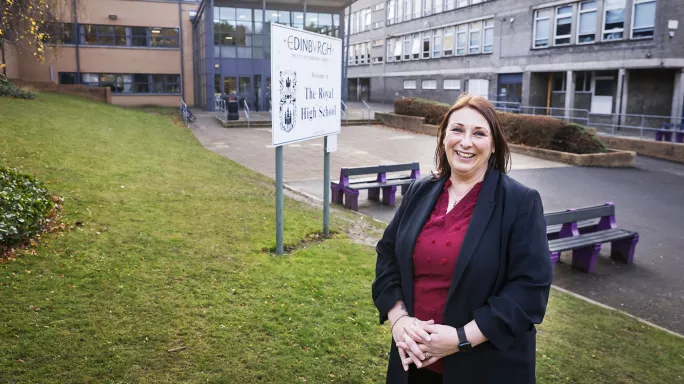
- Home
- Leadership
- Strategy
- ‘You have to trust teachers - what does it say if you don’t?’
‘You have to trust teachers - what does it say if you don’t?’

Pauline Walker became a secondary headteacher at the age of 35, some 15 years ago, when her first child - who “didn’t sleep” - was just over a year old and with a “smashed-up leg” after she fell off a horse during the summer holidays.
It was a somewhat ominous start to life as a head, but with a foothold in the school already - she was senior depute head at Gracemount High in Edinburgh before becoming head - and an amazing staff team behind her, she loved the job from the start.
People can be put off headship because they only see the huge amount of responsibility the role entails, but Walker says she decided to go for the job because she wanted to work for herself, rather than someone else.
Driving a school forward
Even if a headteacher works in a collegiate way, they still have the final say when it comes to “driving the school forward and making the big decisions”, she says. “You’ve got the opportunity to make changes that you think are the right thing to do.”
And Walker - now headteacher of The Royal High School in Edinburgh and who became the new School Leaders Scotland (SLS) president in November - has had her bold policy choices raised in the Scottish Parliament and featured in the national press.
So what will be on her agenda as she represents secondary headteachers throughout Scotland over her one-year term as president? Which common issues and problems will be shaped by her own experiences as a school leader?
She was quick out of the blocks to ban mobile phones; at Royal High, they have to be out of sight and in bags or they are confiscated and returned at the end of the day.
The school has also tackled that other modern-day scourge of schools: vaping.
Vaping alarms were wired into the school’s three main toilets in March and when they go off, Walker emerges from her office “like a rat out a trap”. But after a noisy initial period, that rarely happens now; over the previous three weeks she reckons the alarms have gone off just once.
Ultimately, the alarms have solved two problems: students are no longer reluctant to use the toilets for legitimate reasons and young people no longer hide in the toilets vaping when they should be in class.
“It’s a real deterrent,” she says.
Another priority for Walker has been to ensure education is the best it can be for every single child; she takes very seriously the simple statement of intent that appears under the school crest: “We belong here.”
Essential resources available to all
Essential resources such as pens and pencils are made available for all; school trips are affordable or cost-free or they don’t run; and as well as “pre-loved” uniforms, the school also has a cache of evening wear so that rites of passage such as proms can be attended by all students.
The qualifications the school offers have also evolved to ensure those who do not go to university - more than half of Scottish students nationwide - are catered for.
“Schools never used to touch anything but Highers at level 6; 25 per cent of my curriculum is now [National Progression Awards, or NPAs] at level six.”
Like many secondary school leaders, she is frustrated at the slow pace of assessment reform - but going too fast can also present problems. While she agrees with the vision presented in the June 2023 independent review of qualifications and assessment led by Professor Louise Hayward, she sees it as a 10-year plan.

Reform should be done carefully, she says: “We need to adapt slowly because we need to be careful that we keep young people’s futures protected and we don’t get it wrong.”
Equally, though, it should not be feared.
“If you do little bits at a time, you can test the system and learn and keep moving forward without overwhelming the system. We’ve got very overworked teachers and no money so we need to take it one step at a time. But we need to take that step.”
So, what should be the first move?
“One of the things I would like to see happen very quickly is the word ‘Higher’ goes forever.”
Instead, she argues, qualifications should be named on the basis of the subject studied and their level of difficulty as based on the Scottish Credit and Qualifications Framework (SCQF).
It’s not a new proposal. Hayward’s interim report mooted a similar move but in the final report, the suggestion was dropped. The 2023 independent review of skills by James Withers, meanwhile, also bemoaned the “often bewildering set of different names for qualifications” in Scottish schools and called for “clear, coherent and recognisable learning pathways”, using the SCQF.
‘Snobbish’ favouring of Highers
For Walker, it is about “parity of esteem”. At the moment she says there is a “snobbish view” that five Highers is somehow better than five NPAs at the same level, but she argues “that’s not true at all”, that both groups of students have “reached the same level of learning.”
“We’re making young people feel they’re not good enough despite the fact they’ve done a lot of work to get where they have,” she adds.
Another “easy win” would be to reduce the length of exams sat by students at National 5 level. Walker does not go as far as the Hayward review - which recommended scrapping exams in S4 - but she says there should be a better balance between exams and other kinds of assessment.
“I know the SQA have to maintain the validity of the qualifications and they are very worried about how they do that if they’re putting their trust in teachers - but if we are not putting our trust in teachers what are we saying about the workforce?”

Of course, teacher workload is the other reason cited for not tipping the balance in favour of more teacher assessment or continuous assessment.
The SNP promised in its 2021 Scottish Parliament manifesto to reduce teachers’ class-contact time by 90 minutes a week. A major sticking point in taking the pledge forward has been how this time should be used. Councils want it to be used as collegiate time; the unions say it should go to teachers for preparation and planning.
Walker has little time for this debate, dismissing it as “semantics”.
“Whether you do collegiate time or you’re just on non-class contact time, you’re still not having the same week as you would have had. You are not prepping for those classes, you’re not teaching them, you’re not assessing them. I think that’s a big deal. It gives teachers the ability to breathe a bit more so we need that to come through.”
In some ways, this debate also plays into the hands of the government, allowing it to effectively say - as Gilruth has done - that councils and teaching unions are the barriers to implementation.
In fact, it’s not at all clear how the reduction could be delivered “at pace” - a phrase used by Gilruth at the SLS annual conference in Aberdeen in November - without significant investment in teachers from a government that has been crystal clear the coffers are all but empty.
‘Dire’ shortage of teachers in some subjects
Already there are “many” secondary heads who simply cannot staff their schools, says Walker.
While there is an oversupply of primary teachers and some secondary specialists, there is a “dire” shortage of teachers in maths; craft, design and technology; business education; the sciences; “and even areas like English”, says Walker.
“In places north of the Forth Bridge, they’re really toiling, and as a result young people’s experience is significantly reduced - and that’s no fault of the school.”
Instead of relying on anecdotal evidence, Walker wants a staffing review to pin down the scale of the problem. She wants to see a reduction in the number of teachers trained in subjects such as history and PE where there is an oversupply, with more focus on recruiting and retaining teachers of shortage subjects - especially in the parts of Scotland where they are needed most.
She suggests that the Teacher Induction Scheme - which guarantees teaching graduates a job for a year as they complete their probation - needs to be looked at again. It is leading to a “revolving door” in schools where some faculties have a new member of staff every year.
“They get someone for a year, then another one and another one. That seriously impacts the way a faculty can operate.”

Walker started out as a teacher of a subject that is notoriously difficult for schools to recruit to: computing science. She discovered a love for teaching through a work placement as an undergraduate at Heriot-Watt University, in Edinburgh, where she learned that “teaching folk how to do things is really satisfying - and that kids don’t eat you alive”.
That experience prompted her to pursue a postgraduate teaching qualification instead of going into industry.
But does she ever wish she had just gone off to work for a tech giant?
No, because then she would be “just a programmer or just a data analyst” instead of experiencing all the variety headship entails.
The ‘buzz’ of seeing people learn
The aspect of the job she finds most exciting is innovating to solve problems “at the cutting edge of education”. There are also “instantaneous rewards” to be had on bad days.
“If you are having a tough day, you can just walk into a classroom and feel that buzz you get from watching young people learn.”
She knows that more creativity and imagination will be required in order to navigate the “fiscal challenge” facing schools. They have been asked to do more with less for the past decade and “cracks are widening into chasms”, with more cuts looming.
Technology could provide some answers, she suggests, but one thing remains clear: “We can’t continue to do what we have always done if we don’t have the funding to support it.”
For the latest in Scottish education delivered directly to your inbox, sign up for Tes’ The Week in Scotland newsletter
You need a Tes subscription to read this article
Subscribe now to read this article and get other subscriber-only content:
- Unlimited access to all Tes magazine content
- Exclusive subscriber-only stories
- Award-winning email newsletters
- Unlimited access to all Tes magazine content
- Exclusive subscriber-only stories
- Award-winning email newsletters
You need a subscription to read this article
Subscribe now to read this article and get other subscriber-only content, including:
- Unlimited access to all Tes magazine content
- Exclusive subscriber-only stories
- Award-winning email newsletters
- Unlimited access to all Tes magazine content
- Exclusive subscriber-only stories
- Award-winning email newsletters
topics in this article



